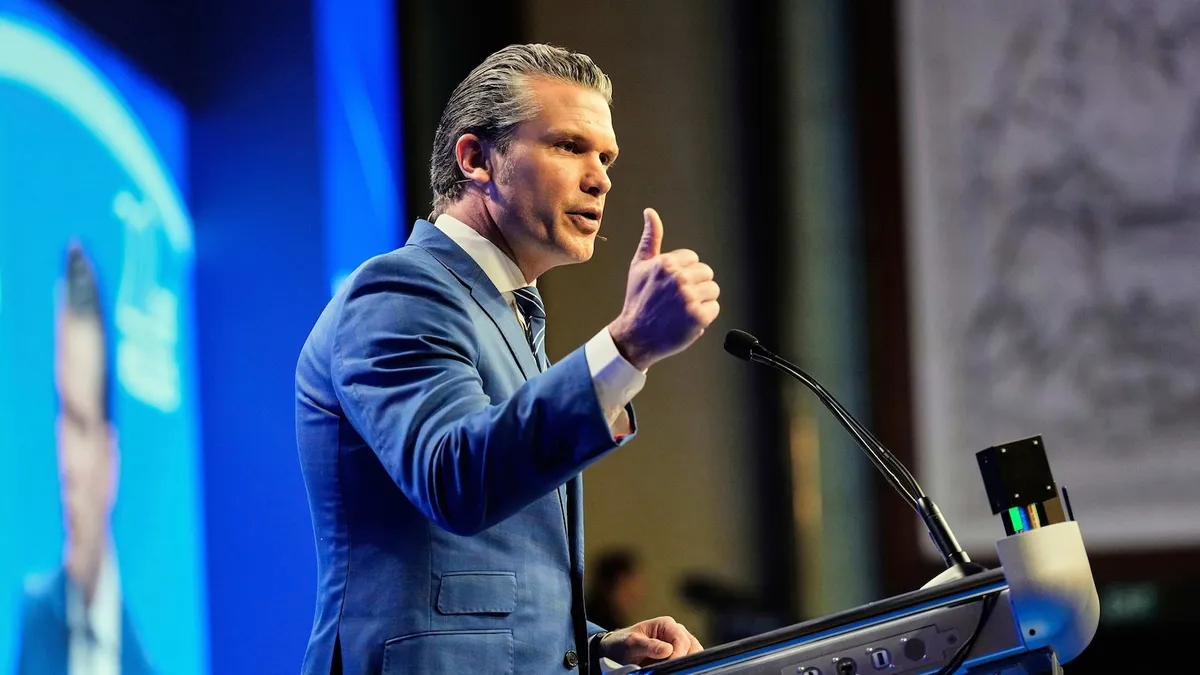
In a significant speech delivered in Singapore on Saturday, U.S. Defense Secretary Pete Hegseth underscored the United States' unwavering support for its allies in the Indo-Pacific region amidst growing concerns over Chinese aggression. Hegseth's remarks, made during the prestigious Shangri-La Dialogue, highlighted the urgent need for vigilance as he warned that military action from China against Taiwan could be imminent.
The annual Shangri-La Dialogue, organized by the International Institute for Security Studies, gathers regional and international security leaders to discuss pressing security issues. Hegseth's speech articulated the Trump administration's perspective on the Indo-Pacific as a key priority and reaffirmed the U.S.'s readiness to support allies in light of China’s aggressive military maneuvers, particularly targeting Taiwan and the Philippines.
"We do not seek conflict with Communist China," Hegseth stated, emphasizing the U.S. stance of respect towards the Chinese people and their civilization. However, he firmly declared that the U.S. "will not be pushed out of this critical region," nor will it allow its allies to be intimidated or subjugated. The Defense Secretary's remarks come as China has intensified its military presence around Taiwan, conducting near-daily harassment of the island's borders, which raises alarms about potential forceful actions to reclaim Taiwan, viewed by Beijing as a breakaway province.
Hegseth acknowledged the uncertainty surrounding China's future actions, saying, "Nobody knows what China will ultimately do." He stressed the urgency for the U.S. and its allies to prepare for potential conflict, stating, "Urgency and vigilance is our only option." He articulated that the U.S. is "preparing for war, to deter war" in a bid to achieve peace through strength. He called upon allies to join in this crucial endeavor, noting, "Our time is now. The threats we face will not wait. Nor can we."
Hegseth made it clear that any attempt by China to conquer Taiwan by force would have dire consequences not only for the Indo-Pacific but for the entire globe. He cautioned that China may act sooner than the 2027 timeline set by President Xi Jinping for military readiness regarding Taiwan. "The threat China poses is real. And it could be imminent," he stated, underlining the seriousness of the situation.
In addition to Taiwan, tensions with the Philippines have escalated, as Chinese military vessels frequently harass Philippine ships within the international waters of the South China Sea. This persistent aggression raises significant concerns about regional stability and security.
The relationship between the U.S. and China has soured in recent years, particularly following President Trump's imposition of steep tariffs on Chinese imports, which prompted reciprocal tariffs from China. Although both countries have reached a tentative agreement to lower tariffs, the underlying tensions remain unresolved.
Hegseth outlined the Trump administration's strategy to restore deterrence, which includes enhancing the U.S. military presence in the western Pacific and assisting allies in strengthening their defense capabilities. He urged Asian nations to emulate NATO allies by committing to increase military spending to 5% of their gross domestic product, aligning with the administration's goal for partners to take greater ownership of their security.
"We ask — and indeed, we insist — that our allies and partners do their part on defense," Hegseth stated. He acknowledged that this may necessitate uncomfortable discussions, but emphasized the importance of honesty and realism in international relations. "This is the essence of a pragmatic, common-sense foreign policy," he noted.
Reassuring allies, Hegseth affirmed that the U.S. will not abandon its partners in potential military engagements. "We will stand with you and beside you to deter Chinese aggression," he declared, reinforcing the necessity of mutual commitment for enduring alliances.
The Shangri-La Dialogue also provided an opportunity for high-level meetings between U.S. and Chinese defense leaders. However, in a notable absence, China's defense minister did not attend this year's forum, with representation instead from a delegation of its National Defense University. Hegseth commented, "We're glad we are here, and we think it makes the region more stable and peaceful."
The rising aggression from China remains a critical topic of discussion at the conference, which also featured an opening address by French President Emmanuel Macron. He highlighted the necessity for a new alliance between European and Asian nations to prevent becoming collateral damage in the geopolitical struggles between superpowers. Macron cautioned against the potential loss of credibility in the international rules-based order, emphasizing the importance of maintaining territorial integrity and national sovereignty.
In conclusion, Hegseth's speech at the Shangri-La Dialogue articulates a clear message: the U.S. is committed to standing firm alongside its allies in the Indo-Pacific to counter Chinese aggression and ensure regional stability. The call for unity and preparedness resonates as tensions rise, making it imperative for nations to collaborate in safeguarding their interests.